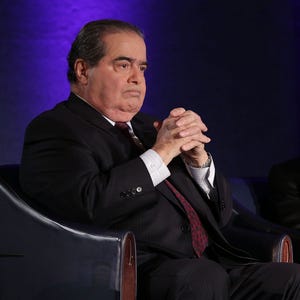Supreme Court races the clock on gay marriage, Obamacare and more

Jose Luis Magana, AP
The Supreme Court faces gay marriage, Obamacare and a number of other hot-button issues as it works to complete its 2014 term this month.
WASHINGTON — The future of same-sex marriage and President Obama's health care law hang in the balance as the Supreme Court's 2014 term draws rapidly to a close this month. But those aren't the only big issues on the justices' plate.
Free speech and fair elections. Religious liberty and racial discrimination. Clean air and capital punishment. All await rulings over the next three weeks as the court completes action on 20 cases remaining this term. The next decisions will come Monday morning.
Here's a look at the Elite Eight:
• Same-sex marriage. In a decision likely to come on the term's last day — possibly June 29 or 30 — the court will decide whether gays and lesbians have a constitutional right to marry or whether state bans against same-sex marriage can remain in place.
Six cases from Ohio, Michigan, Tennessee and Kentucky have been consolidated for the court's consideration. In them, 32 total plaintiffs are asking for the right to marry or to have marriages licensed elsewhere recognized in their home states. Most legal experts predict the court, led by Justice Anthony Kennedy, will rule in favor of the gay and lesbian couples.
• Obamacare. The future of Obama's health care law is on the line for the second time in three years, and it's anyone's guess how the court will rule.
Passed in 2010 and narrowly upheld by the court in a 5-4 ruling in 2012, the law has extended health insurance to 12 million Americans. But four words in its lengthy text — "established by the state" — now endanger federal subsidies relied upon by 6.4 million participants in 34 states that did not create their own exchanges or marketplaces. The justices must decide whether the law prohibits that financial aid.
• Clean air. Environmental regulations approved by the Obama administration regularly come before the Supreme Court, and this year is no exception. A major rule requiring coal- and oil-fired power plants to reduce emissions of mercury and other toxic air pollutants hangs in the balance.
The justices appeared closely divided on the central issue in the case — whether the Environmental Protection Agency should have considered the nearly $10 billion annual cost in relation to the potential benefits before approving the regulation — when it was argued. A decision in favor of objecting states and utilities could send the EPA back to the drawing board.
• Housing discrimination. The third time could be the charm for the court's conservatives, who tried twice in recent years to consider cases challenging the way housing bias claims are decided.
Under the Fair Housing Act of 1968, minority groups have been able to win lawsuits by showing that housing practices — such as sales, rentals, zoning and lending — have a disparate impact on minorities. Housing industry opponents challenging the law say it was intended only to ban intentional discrimination.
• Lethal injections. The death penalty also is never far from the high court's docket. After a steady diet of cases and emergency appeals on issues such as claimed intellectual disabilities and the actions of defense lawyers and prosecutors, the court now must rule on a relatively new method of execution.
The case involves the use of a sedative called midazolam as part of a three-drug cocktail used by several states, including Oklahoma, where three death-row inmates are challenging its use. Unlike stronger barbiturates that are in short supply, the drug has failed in some cases to block pain and suffering during the lethal injection process.
• License plates. This is a free speech case that hinges on who is speaking — the state government issuing specialty license plates or the vehicles' owners.
Texas, which like every other state issues such plates to produce revenue while promoting a variety of causes, refused to approve the Sons of Confederate Veterans' request for a plate featuring the Confederate flag. The justices must decide if the government has the right to suppress its own speech or must allow private speech by motorists, no matter how offensive.
• Political maps. In the second case to reach the court this year on political redistricting, the justices must decide whether nonpartisan commissions can replace state legislatures in drawing congressional district maps every 10 years.
Those commissions are used in seven states, including California, to take the redistricting process out of the hands of politicians with a vested interest. But the Arizona state Legislature's Republican majority argued that the Constitution gives that power solely to state legislatures. A majority of the court's justices appeared to agree during oral arguments.
• Religious signs. Also from Arizona comes a case combining religious freedom and highway clutter. Tiny Good News Community Church is challenging the town of Gilbert's sign ordinances, which restrict signs advertising upcoming events — such as church services — far more than political and ideological signs.
While acknowledging that local governments can regulate for the purposes of beautification, the justices likely will rule that the town went too far in limiting church event signs to 6 square feet and 13 hours. That would be good news for Good News.









No comments:
Post a Comment